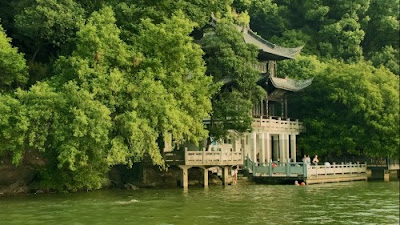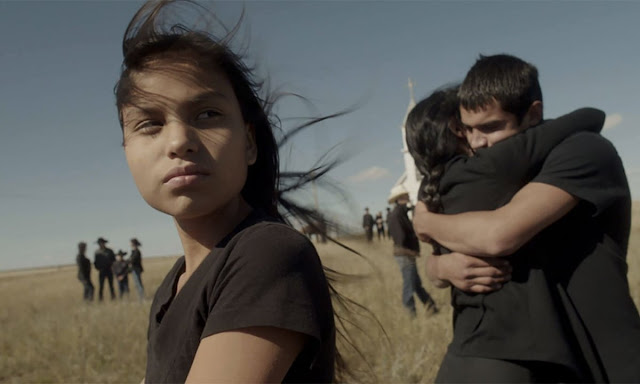Honorable Mention: Bloody Kids (1980), directed by Stephen Frears - Stephen Frears' film about two young boys (Richard Thomas and Peter Clark) surging through the nocturnal wasteland of new-wave dead end Essex, England after a prank goes horribly wrong is a masterpiece of anarchic energy. With a propulsive soundtrack that swaggers from inspired spaghetti-western theatrics to thudding heavy metal and a camera that swoops and glides around its characters with breathless energy, "Bloody Kids" captivates from the very opening. It only gets better when one of the young boys hooks up with a group of older men and women (led by the manics of Gary Holton) and the film sinks into an orgy of anti-establishment nose thumbing and petty criminality. Made for television and released in 1980, this is a film that deserves a rediscovery for its nervy ambition in representing the nihilistic attitude of punk rock Britain in the late 70's. For the record, the cops (and supposed adults) in this film don't get off easily either.
10. A Special Day (1977), directed by Ettore Scolla - Taking place over the course of a single day, "A Special Day" soon dispenses with every other character besides housewife Sophia Loren and writer Mastroianni as their crowded apartment building neighbors disappear into the streets to wave and cheer Hitler and Mussolini. The apartment building is empty, except for a solitary man working in his apartment directly across from Loren's view. When her pet bird escapes his cage and flies to his windowsill, the man and woman meet, talk, flirt and exchange ideas about the maelstrom of history swirling around them. While she chose not to go because she simply doesn't care about Italy's political strategy, he can't go anywhere for reasons that will become crushingly obvious before the end
Loren and Mastroianni, who've been paired so many times before, have a casual elegance about them as they come together and fall apart, their dialogue rolling between them with the ease of professionalism both continually exhibit in all their work. Mastroianni, especially, is tasked with a conflicted character, at once attracted to Loren for her ideals and then forced to confront emotions that are hidden behind his true self.... emotions that have him writing with one hand and keeping a pistol close by with the other. And Loren, in the final image as she watches something across the courtyard, gives a full performance that suggests an alternate life would suit her perfectly. From its magical opening shot to its final shadows of people being led away to nefarious futures, Scolla's seemingly meet-cute romance feels like the template for Richard Linklater's "Sunrise" trilogy and so many others to come.
9. Dwelling in the Fuchun Mountains (2019), directed by Gu Xiaogang - Visually soft like feather one second and then emotionally draining the next, Gu Xiaogang's "Dwelling in the Fuchun Mountains" takes the generational storytelling of Edward Yang and the visually intricate mise en scene of Hou Hsiao Hsien and creates a masterpiece of an effort. Serene locations play host to three generations of a family as they deal with the troubles of life (i.e. love, death, and gambling), but the magnificence of the film lies in the way its filmmaker frames everything. Subtle and complex long takes suspend time while real connections are made between people and the landscape's ethereal beauty is the painting in which they wander around in. It's a wonderful film that shows and tells the small sacrifices of life.
8. A Poem is a Naked Person (1974), directed by Les Blank - Rarely shown outside of personal events hosted by the filmmaker himself for more than 40 years, "A Poem Is a Naked Person" only really saw the light of day in 2015 and 2016 after Blank's death, when it was remastered and released through Criterion with the generous support of Blank's son and the musician/subject Leon Russell himself. What emerges in this crusty document of early 1970's hazy bohemian atmosphere is a blast. Darting from a wedding of Russell's band member hosted in his very Southern gothic mansion to interviews with an entertaining man who eats glass at an Oklahoma air show, "A Poem Is a Naked Person" is just as weirdly poetic as its title suggest. One does get a ton of Russell's earthy alt-country/rock music (and even more cameos from friends as diverse as Eric Anderson, JJ Cale and Willie Nelson), but the intention of the documentary is to replicate a time and place not through aggrandizement, but a down-and-dirty synthesis of creative artistry and all the weird freedom that comes with its boozy, carefree lifestyle. I can only imagine the reaction if Les Blank's "A Poem Is a Naked Person" had actually been unleashed on the movie-going public when it was finished in 1974
7. The Taste of Violence (1961), directed by Robert Hossein - One of my favorite directors to discover over the past few years has been actor-director Robert Hossein. Producing a string of low-key thrillers and bastardized westerns with nary a hint of release on any video format (or streaming) here in the US, it's somewhat thrilling to continue finding small gems like this, as if I'm the only one who knows about them. This 1961 western tracks with the rest of his work, barreling though a variety of themes such as the almost wordless anti-hero Hossein himself plays, a Stockholm syndrome kidnapping, and superfluous camera moves that feel needlessly pompous and so freaking perfect at the same time. Hossein plays Perez, the leader of a band of Mexican outlaws who kidnap the president's daughter (Giovanna Ralli) and then tear themselves apart with jealousy and greed over her return to other revolutionary forces. Often filmed with searing landscapes behind them and never afraid to shy away from horrifying tableaux (such as a group of men hanging alongside a cobblestone street like heavy pinatas), "The Taste of Violence" is a western quite unlike any other.
6. House of Hummingbird (2018), directed by Kim Bora - Kim Bora's three hour portrait of a young girl's navigation of her pubescent life is tender and evocative, none moreso than the lengthy scene in which Eun-Hee (Park Ji Hoo) dances and pounds her feet on the floor, partly out of frustration but mostly because it's the only time she can steel herself from the emotional volcano of the world around her. She drifts in and out of friendships, finds first love, and deals with the crushing bureaucracy that takes her favorite and inspirational teacher (Kim Sae-Byuk) away from her in the blink of an eye. "House of Hummingbird" is so full of life- both fair and unfair- that it makes one cringe with empathy as we reflect on our own inability at that age to understand what's going on around us. It's a film that's sad but affirming that we're not alone in this world. As a debut effort, "House of Hummingbird" proudly announces Bora as a talent that deserves to have anything she dares conjuring put up on the screen for all to relish.
5. A Canterbury Tale (1944), directed by Emeric Pressburger and Michael Powell - A road movie interrupted by a bit of Nancy Drew mystery, Powell and Pressburger's "A Canterbury Tale" is a magical exploration of faith and perspective during wartime. Every motive here- whether it's the eventual unmasking of the mysterious "glue man" or the unwavering goodness of its three main characters- belies a deep understanding of human nature, made even more resplendent by the film's final moments. It seems dicey at first, but Powell and Pressburger make good on their promise to unite their medieval source material with the mechanisms of 1940's war-torn England. As the trio who find their way to various types of perspective and bliss, Eric Portman, Sheila Sim and Dennis Price are excellent, and the way the film maneuvers them through various genres is exhilarating, culminating in what's probably the simplest and magical denouements in the filmmaking duo's long and illustrious career. I watched this twice in about a week after first seeing it earlier this year and I can't imagine a more palette cleansing way to celebrate cinema than this.
4. Nightmare Alley (1947), directed by Edmond Goulding - Based on a novel by William Lindsey Gresham (whose real life seemed like a mirror to the hard drinking and pessimistic outlook of many of the film's characters), "Nightmare Alley" seems to fit in a variety of genres. It's been called horror (as one scene towards the end certainly has "The Innocents" vibes), film noir (where it seems to be slotted most of the time) and postwar thriller since its release in 1947. For my money, its unclassifiable because it handles so many of its twists and turns with mastery. As the wanderer-turned-mentalist-conman, Tyrone Power is perfect, and Goulding treats the entire affair with the utmost sincerity. Thinking back several days after absorbing this bleak psychological thriller, I don't recall a single ray of sunlight penetrating its mass. Even the opening carnival scene- typically a sun drenched affair for families to frolic and glare at the attractions- takes place at night. We'll ultimately get the Hollywood remake in a couple of months (and I only hope it half as good as the original), but this late 40's version stands as one of the great films of the period. And even though the ending is telegraphed a bit, it still resonates with chilling vibrancy about the comeuppance it provides its suave men and women.
What a year for Chloe Zhao. From winning the Oscar to helming a mega budget Marvel film, it was definitely an arrival for the mainstream. But, as this debut film proves, she's been here all along. Like she did with her sophomore film "The Rider" (2018), "Songs My Brothers Taught Me" takes place with people mostly portraying themselves.... or at least thinly veiled fictional recreations of themselves. And it wouldn't be far off to wonder if that later film didn't rise out of the barren-land ashes of this film as Zhao's camera often becomes much more interested in the rodeo bucking community that fraternally rubs against her Indian reservation-set debut. But regardless of its foundations, "Songs My Brothers Taught Me" is an amazing film for the way it never seems to be in a rush of narrative. Things happen and great developmental arcs occur, but the film just captures a sense.... a time... and a place with generous acuity. And, like most of her films, it's a mood thing. Zhao often frames the activity around the reservation in long shot, allowing for streaks of lightning to cascade in the background or curtains of sunset light to bathe the screen. The mixture of nature and man- that is so prevalent in all her work- gets first attention here. It's a beautifully rendered atmosphere for her characters to bounce around this big sky country with dour, internalized permutations of angst and trepidation. We feel for them because although they reside in a place largely foreign to my experience, the emotions and depth of confusion in growing up are universal. Zhao seems to excel in creating these types of stories and I look forward to following her long and beautiful career.











No comments:
Post a Comment